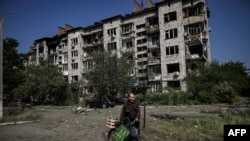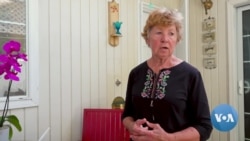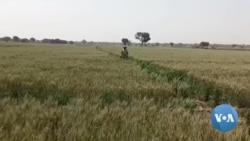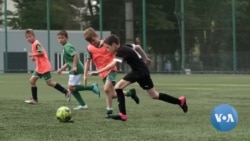For full coverage of the crisis in Ukraine, visit Flashpoint Ukraine.
The latest developments in the conflict between Russia and Ukraine. All times EDT.
10:07 p.m.: In his nightly video address, President Volodymyr Zelenskyy, on Children’s Day, spoke about the number of children killed and wounded since Russia invaded the country on Feb. 24.
“Every year on June 1 we celebrate Children's Day. A special day when adults pay special attention to the rights of children, safety and development of our kids. But since February 24, everything has changed in our country. And literally every day now is a day of protection for us. Protection of all our people, children, our future. Protection of a free country where every child can, when he or she grows up, live the life he or she wants. Without coercion and oppression,” he said.
“During the 98 days of the Russian invasion, 689 children were injured as a result of the occupiers' attacks. And these are only those we know about. We do not yet have all the information from the territory that is currently occupied. But from what is known today - 446 children were injured, 243 children died. 139 went missing,” Zelenskyy said.
9:15 p.m.: Even as the European Union decided to reduce Russian crude oil imports by 90% by the end of the year, Italy has become the only country in Europe to increase them, an unintended consequence of EU sanctions against Russia, The Associated Press reports.
Italy agreed with its EU partners to cut Russian crude imports by 2023, but Rome also has to deal with the fate of the refinery in Sicily owned by Russia’s Lukoil.
As a result of previous sanctions against Russia, banks have refused to take the risk of extending credit to Russia-controlled ISAB that would allow it to buy oil from non-Russian sources, so ISAB has gone from processing 15% of Russian crude to 100%.
Ships continue to arrive at the port-side refinery with crude oil from the Russian parent company, including about 400,000 barrels of Russian oil a day in May, four times the pre-invasion levels, according to the Kpler commodity data company.
8:27 p.m.: The United Kingdom seeks U.S. approval to send American-made medium-range MRLS to Ukraine, Politico reported. The U.K’s request can after the U.S. announced its plans to send similar weapons.
The MRLS in question is the M270, which can strike targets 80 km away, similar to HIMARS given to Ukraine by U.S. However, the more modern HIMARS is quicker.
7:18 p.m.:
6:40 p.m.: Ireland's Parliament recognizes Russia's invasion of Ukraine as genocide.
6 p.m.: U.S. President Joe Biden will meet with NATO Secretary-General Jens Stoltenberg at the White House on Thursday, along with Biden’s national security adviser, Jake Sullivan, White House press secretary Karine Jean-Pierre said.
Stoltenberg told reporters after a meeting with U.S. Secretary of State Antony Blinken on Wednesday that he would convene a meeting in Brussels in the coming days with senior officials from Sweden, Finland and Turkey to discuss Turkey's opposition to Sweden and Finland joining the defense alliance.
5:15 p.m.: One of the world's largest yachts sits in a quiet United Arab Emirates port — so far avoiding the fate of other luxury vessels linked to sanctioned Russian oligarchs — in one of the poorest emirates, a 90-minute drive from the illuminated high-rises of Dubai, The Associated Press reported.
The 118-meter Motor Yacht A's presence in a Ras al-Khaimah creek shows the UAE's neutrality during Russia's war on Ukraine as the Gulf country remains a magnet for Russian money and its oil-rich capital sees Moscow as a crucial OPEC partner.
Since Russian tanks rolled into Ukraine, the seven sheikhdoms of the Emirates have offered a refuge for Russians, both those despairing of their country’s future as well as the mega-wealthy concerned about Western sanctions.
Motor Yacht A belongs to Andrey Melnichenko, an oligarch worth some $23.5 billion, according to Forbes.
4:44 p.m.: A number of civilians are sheltering from Russian shelling under a chemical plant in the Ukrainian city of Sievierodonetsk and authorities fear it may still have stocks of dangerous materials, the regional governor told Reuters on Wednesday.
Russian forces entered the city, the largest still held by Ukraine in the eastern Luhansk region, late last week after weeks of shelling as they try to take full control of the industrial Donbas region.
"There are civilians there in bomb shelters, there are quite a few of them," Luhansk regional governor Serhiy Haidai said of the Azot chemical plant, adding that there were "strong Soviet-era" bomb shelters under the factory.
"We were assured that there were no (chemicals) left, but as we can see there are still some remnants," he said.
Reuters could not independently confirm the account.
4:10 p.m.: Denmark will join the European Union's defense policy after a referendum on Wednesday, public broadcaster DR projected, and Reuters reported. It signals the latest shift among Nordic countries to deepen defense ties in response to Russia's invasion of Ukraine.
Denmark is the only EU member that is not part of the bloc's defense and security policy, after the country secured several exemptions in a 1993 referendum.
3:30 p.m.: Without an urgent ceasefire in Ukraine, children will continue to suffer, says United Nations International Children's Emergency Fund (UNICEF).
3:15 p.m.: Vyacheslav, 18, from Ukraine's Donetsk region, became the guardian of four younger siblings after their mother was killed by a Russian shell and their house was completely destroyed. Hundreds have now offered to help the family after their story featured in a video by RFE/RL's Ukrainian Service.
3:00 p.m.: Can western artillery stop Russia’s progress in the Donbas? Radio Free Europe/Radio Liberty looks into it in this report.
2:40 p.m.: Russia relentlessly shelled Sievierodonetsk in eastern Ukraine on Wednesday, with the Luhansk regional governor conceding that Moscow’s forces now control 70% of the city and that evacuation of civilians had been halted. Some Ukrainian troops were still fighting against the Russian onslaught, Luhansk governor Serhiy Haidai said, but others had retreated.
2:31 p.m.: Ukrainian Galina Pashkevich witnessed Nazi atrocities during World War II, including the bombing of her city, Kyiv. After Russia invaded Ukraine in February, she left her homeland for America. Angelina Bagdasaryan spoke to her in this report. Anna Rice narrates. Camera: Vazgen Varzhabetian.1:55 p.m.: The Department of Defense (DoD) announced the authorization of additional security assistance valued at up to $700 million, to help the Ukrainians repel the Russian offensive in the east. VOA’s Pentagon Correspondent Carla Babb reports that Undersecretary of Defense for Policy Colin Kahl says the initial tranche will include High Mobility Artillery Rocket Systems to help "provide Ukraine with additional precision in targeting." Kahl also says that “Ukrainians have given us assurances that they will use this system for defensive purposes only." Other items will include 1,000 Javelins and 50 Command Launch Units, and 6,000 anti-armor weapons.
1:00 p.m.: Nigerian manufacturers say they are struggling with rising grain prices, especially for wheat, sparked by Russia's war on Ukraine. But even before the war started in February, Nigeria had been dealing with fuel and power shortages and high inflation. Timothy Obiezu reports from Abuja, Nigeria.
12:05 p.m.: U.S. Secretary of State Antony Blinken and NATO Secretary General Jens Stoltenberg reiterated the need for countries to continue to support Ukraine against Russia's aggression, The Associated Press reports. Their meeting in Washington on Wednesday comes as the Biden administration announced it will send Ukraine a small number of high-tech, medium-range rocket systems, a critical weapon that Ukrainian leaders have been begging for as they struggle to stall Russian progress in the Donbas region.
11:50 a.m.: Russian Foreign Minister Sergei Lavrov on Wednesday said international sanctions are affecting Russia’s ability to export its own grain amid fears of a global food shortage, The Associated Press reports. Speaking during a visit to Saudi Arabia, Lavrov said Russian grain exports may not be directly under sanctions, but the ships carrying the grain face extra hurdles.
11:20 a.m.: US Permanent Representative to NATO Julianne Smith praised Ukraine progress which she said is not always linear. Speaking at The Defense Writers Group in Washington, she says that “we [NATO] do hope and believe that Ukraine will ultimately prevail…The allies remain united in their determination to continue providing security assistance to Ukraine. I don't see anyone moving away from that mission". She also notes that Turkey’s outreach to Russia to negotiate is good BUT "we're skeptical that at this juncture it's going to lead to some sort of major breakthrough." More with VOA’s National Security Correspondent Jeff Seldin.
9:51 a.m.: With tens of thousands of displaced Ukrainians living in the western city of Lviv, local football (soccer) academies opening their doors to help them take their minds off the war. Details from reporter Omelyan Oshchudlyak ((O-me-lia-n O-sch-ud-lia-k)) in Lviv.
9:40 a.m.: Poland stands to get an economic boost from agreements to help Ukraine, the prime minister said on Wednesday, as he opened temporary housing funded and built by Warsaw in a town that was largely destroyed during the war with Russia. Benefits could come from possible agreements to re-export Ukrainian grain, help Ukraine rebuild its infrastructure, and by importing power from its neighboring country according to Reuters.
9:37 a.m.: The United States is the target of thousands of cyberattacks daily, many of them originating in Russia. If tensions between Washington and Moscow escalate further over the war in Ukraine, experts worry that Russian leader Vladimir Putin will order a full-scale cyberattack that could devastate America’s critical infrastructure. VOA’s Igor Tsikhanenka reports on the likelihood of such a scenario.
9:00 a.m.: Kremlin spokesman Dmitry Peskov says Moscow “negatively” views U.S. plans to supply more weapons to Ukraine, The Associated Press reports. He said during his daily conference calls with journalists on Wednesday that Moscow doesn’t trust Kyiv’s assurances that the multiple-launch rocket systems supplied by the U.S. will not be used to attack Russia.
8:45 a.m.: U.N. Secretary-General Antonio Guterres said on Wednesday he was hopeful of a solution to alleviate the impact of the war in Ukraine on global food supplies, but cautioned any agreement might be a while, Reuters reports. "These are complex things and the fact that everything is interlinked, makes the negotiation particularly complex," he told a news conference with Swedish Prime Minister Magdalena Andersson in Stockholm.
8:30 a.m.: South Africans are feeling the bite of fuel price increases that are blamed on Russia’s war in Ukraine and the rise in the Brent crude oil price according to a report by The Associated Press. Neighboring Zimbabwe and other African countries are also grappling with increasing fuel prices. The latest increases make fuel in South Africa about 40% more expensive than a year ago. In Somalia the prices have almost doubled according to this post by the International Committee of the Red Cross.
8:00 a.m.: Western nations promised more and more advanced arms to bolster Ukraine’s defense, The Associated Press reports. Germany said Wednesday it will supply Ukraine with modern anti-aircraft missiles and radar systems. The U.S. will unveil a new weapons package later in the day that will include high-tech, medium-range rocket systems. German Chancellor Olaf Scholz told lawmakers that the IRIS-T SLM missiles it will send are “the most modern air defense system that Germany has.”
7:35 a.m.: The Kremlin warned on Wednesday that the European Union's sanctions on Russian oil would hit the global energy market but said Moscow could re-route exports to limit its own losses, according to Reuters. "These sanctions will have a negative impact on the entire continent - for Europeans, for us, and for the entire global energy market," Kremlin spokesperson Dmitry Peskov told reporters.
7:00 a.m.: Denmark’s largest energy company Ørsted says Russia cut off its gas supply because it refused to pay in rubles, according to The Associated Press. Russia previously halted natural gas supplies to Finland, Poland, Bulgaria and the Netherlands for refusing a demand to pay in rubles. Ørsted said it still expected to be able to serve its customers.
5:00 a.m.: One of the world’s largest yachts sits in a quiet port in the United Arab Emirates — so far avoiding the fate of other luxury vessels linked to sanctioned Russian oligarchs. The 118-meter (387-foot) Motor Yacht A also shows the UAE’s neutrality amid Russia’s war on Ukraine as the country remains a magnet for Russian money and its oil-rich capital sees Moscow as a crucial OPEC partner.
Since Russian tanks rolled into Ukraine, the UAE has offered a refuge for Russians, both those despairing of their country's future as well as the mega-wealthy concerned about Western sanctions. The superyacht belongs to Andrey Melnichenko, an oligarch worth some $23.5 billion. The Associated Press has the story.
4:35 a.m.: Germany will supply Ukraine with the IRIS-T medium-range surface-to-air defense system, Chancellor Olaf Scholz said, following pleas from Kyiv as well as German opposition parties to step up heavy weapons deliveries to the country, Reuters reported.
“We have been delivering continuously since the beginning of the war,” Scholz said on Wednesday, pointing to more than 15 million rounds of ammunition, 100,000 hand grenades and over 5,000 anti-tank mines sent to Ukraine since Russia invaded the country on February 24.
“Most recently, the government has decided that we will deliver the most modern air defense system that Germany has in the form of the IRIS-T,” Scholz told lawmakers in the Bundestag.
4:15 a.m.: Pope Francis on Wednesday appealed to authorities to lift the block on wheat exports from Ukraine, saying the grain cannot be used as a “weapon of war.”
Speaking at his general audience to thousands of people in St. Peter’s Square, he said the block should be lifted because many millions of people depend on wheat from Ukraine, particularly in the world’s poorest countries.
3:00 a.m.: VOA posts a story about a firm creating mobile laboratories and clinics that could help fill the healthcare gap created by, according to the World Health Organization, the more than 250 attacks on health facilities and health personnel in Ukraine since it was invaded by Russian forces. Genia Dulot has the report for VOA.
2:20 a.m.: Beyond the Donbas, Russia continues to conduct long-range missile strikes against infrastructure across Ukraine, the British defense intelligence report said on Wednesday.
“The strategically important bridge links Ukraine with Romania and with Ukraine’s ports on the Danube, which have become critical to Ukrainian exports after the blockade of Ukrainian Black Sea ports by Russia.”
Russia continued its focus on ground operations with intensified fighting in Sieverodonetsk streets the ministry added in its daily report.
2:00 a.m.: Swiss financial market supervisor FINMA extended through August a ban on the Swiss arm of Russia’s largest lender Sberbank from making payments and transactions, as well as other measures designed to protect creditors, Reuters reported.
FINMA imposed the measures on Sberbank (Switzerland) on March 4 following Russia’s invasion of Ukraine, which prompted a host of sanctions to be imposed by Western countries, the report said. They were later extended through May 31, with FINMA on Wednesday adding on a further two months. “The measures will remain in place until 2 August 2022 owing to heightened international sanctions and the continuing risks for the bank's liquidity situation,” FINMA said in a statement.
1:30 a.m.: Russian defense ministry claimed Wednesday that its forces are holding drills with about 1,000 servicemen in the Ivanovo province, a city located northeast of Moscow, Reuters reported citing the Interfax news agency. The ministry said the exercise includes “intense maneuvers using over 100 vehicles including Yars intercontinental ballistic missile launchers,” news agency reported.
Earlier, U.S. President Joe Biden made mention of the threat of nuclear weapons since Russia’s invasion of Ukraine in an Op-Ed he penned for The Times on Tuesday. “I know many people around the world are concerned about the use of nuclear weapons,” Biden said. “We currently see no indication that Russia has intent to use nuclear weapons in Ukraine, though Russia’s occasional rhetoric to rattle the nuclear saber is itself dangerous and extremely irresponsible. Let me be clear: Any use of nuclear weapons in this conflict on any scale would be completely unacceptable to us as well as the rest of the world and would entail severe consequences.”
12:15 a.m.: U.S. President Joe Biden said Tuesday he decided to provide Ukraine with “more advanced rocket systems and munitions” as part of U.S. efforts to help the Ukrainian fight against a Russian invasion now in its fourth month.
Biden wrote in an opinion piece in The New York Times that the United States has aided Ukraine with weapons and ammunition in order to bolster its position on the battlefield and ultimately in peace negotiations with Russia.
“Unprovoked aggression, the bombing of maternity hospitals and centers of culture, and the forced displacement of millions of people makes the war in Ukraine a profound moral issue,” Biden said.
Biden wrote Tuesday that he does not seek war with Russia.
“As much as I disagree with Mr. Putin, and find his actions an outrage, the United States will not try to bring about his ouster in Moscow,” Biden said. “So long as the United States or our allies are not attacked, we will not be directly engaged in this conflict, either by sending American troops to fight in Ukraine or by attacking Russian forces. We are not encouraging or enabling Ukraine to strike beyond its borders.”
12:01 a.m.: Russian opposition figure and jailed Kremlin critic Alexei Navalny could face 15 more years under a new charge, The Associated Press reported.
Navalny took to social media Tuesday to say he now has been charged with starting an extremist organization. There has been no official announcement about new charges against Navalny.
Navalny was jailed last year when he returned to Russia after receiving medical treatment in Germany following a poison attack with a Soviet-era nerve agent during a visit to Siberia in 2020. Navalny blamed Putin for the attack.
He is currently serving a two-and-a-half-year sentence in a prison camp east of Moscow on a 2014 embezzlement conviction. Navalny has been a longtime outspoken critic of the government, including calling the Russian invasion of Ukraine, “stupid” and “built on lies.”
Last year, Navalny’s foundation was outlawed after being labeled “extremist” by authorities, who blocked tens of websites run by his network.
Some information in this report came from The Associated Press and Reuters.













